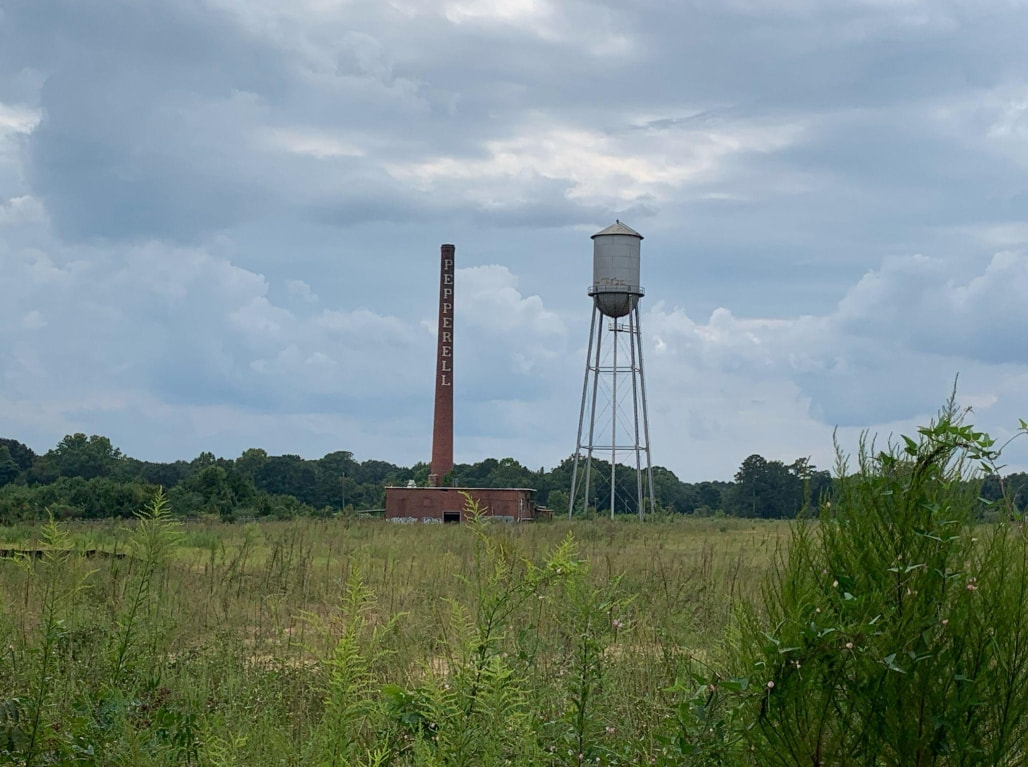 The only surviving remains of Pepperell Mill on what is now an overgrown lot. (Photo credit: Eli Baggett)
The only surviving remains of Pepperell Mill on what is now an overgrown lot. (Photo credit: Eli Baggett) Pepperrel did not merely buy the old cotton fields upon which the mill now stands, but they also bought a large amount of land in the surrounding area. The mill built one-hundred houses for people who worked in the mill. They could be rented out for the cheap price of $2 a room. All maintenance issues were handled free of charge by the year-round maintenance service provided by the mill. The area, however, did not consist of just the mill and subsequent houses. It also consisted of a Pepperell-sponsored schools serving kindergarten through ninth grade; a center for many community activities; a clinic with two practicing RNs; plus a retail store, drugstore, and movie theatre. The mill also built a church, which alternated between Methodist and Baptist services every Sunday. Many young sons of mill workers would get a job delivering the mail or as order-fillers, as the post office shared the building with the drug store. Besides bringing revenue and jobs to the Opelika area, the mill was also known for their community investment.
This investment included a Pepperell Mill sponsored men’s baseball team and both a men’s and women’s basketball team. During The Great Depression, contrary to many mills around the nation, the Pepperell mill never once shut down. The Pepperell Manufacturing Co. (later merging with West-Point Manufacturing Co. in 1965) would continue to be active in the community all the way to 2008 when the mill closed its door for the last time. Sadly, the mill turned to the ground on March 12, 2013, amidst an effort to demolish part of the then-decrepit building.
The only remains of the mill today is a water tower and a single smoke stack bearing the name “Pepperell.” This smoke stack alongside more than 100 houses still crammed next to what is now an empty lot serve as a reminder of prosperous days gone by for Opelika. A period that saw a population increase of over 17,000 between 1920 and 1990. When the Northern-based Pepperell mill company decided to call this small town their Southern home they changed the lives of thousands of Opelikians for generations to come.
Additional information:
- Alexander Nunn, Lee County and Her Forebears (1984)
- Lee County Committee, The Heritage of Lee County, Alabama (2000)
- "Large fire sweeps through Opelika's old West Point Stevens Pepperell Mill" WSFA-12 video
- "Daniel Pratt and the Working Mill Village" by Sara Caroline Taricco in Alabama Heritage Issue 133.
AuthorEli Baggett is a freshman majoring in secondary education with a focus in social science at the University of Alabama at Birmingham. He was born in the community of Beauregard, Alabama, just outside of Opelika, and lived there until he began his studies in Birmingham. He plans on becoming a high school history teacher following graduation and looks to continue his passion for sports in the form of coaching. |

 RSS Feed
RSS Feed